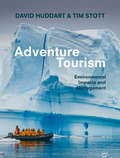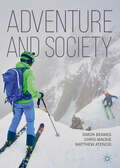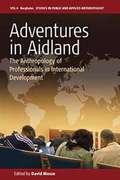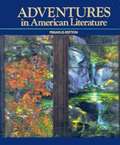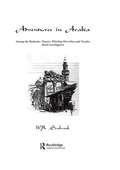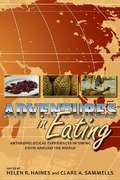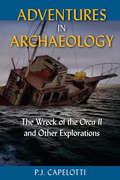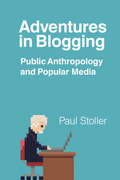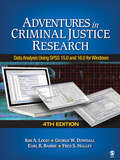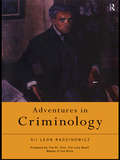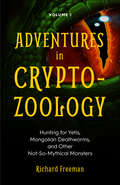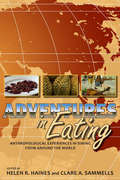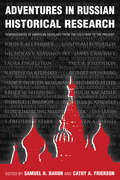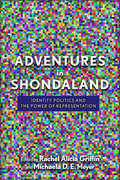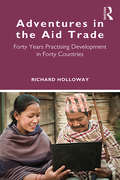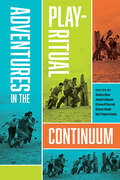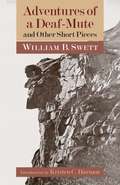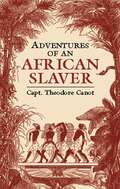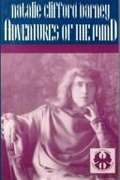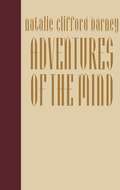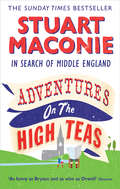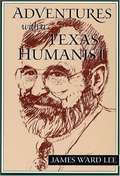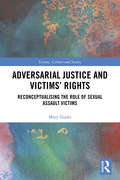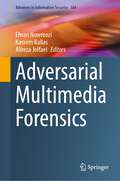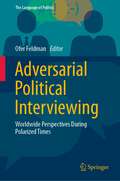- Table View
- List View
Adventure Tourism: Environmental Impacts and Management
by Tim Stott David HuddartThis textbook presents a comprehensive overview of the environmental impacts of various types of adventure tourism and how these can be best managed. This volume follows on from the authors previous textbook – ‘Outdoor Recreation: Environmental Impacts and Management’ and continues the aim of developing a deeper understanding of how tourist numbers impact the environment and to provide practical solutions to these problems. Combining their own first-hand experience and research with extensive literature review the authors' present several popular adventure tourism destinations from across the globe, including the Arctic, the Himalayas, Africa, Australia and Scotland as case studies. Chapters cover the particular challenges faced by each region: including impacts on animals and birds; the spread of invasive plant species and diseases; trail impacts on vegetation; impacts on geological, historical and archaeological sites and pollution and waste issues. A discussion and evaluation of the possible management actions for minimising these impacts and how outdoor recreation tourists can be regulated concludes each chapter. This practical and engaging textbook will be invaluable to students and scholars of adventure tourism and outdoor recreation as well as practitioners and managers working in the field.
Adventure and Society
by Simon Beames Chris Mackie Matthew AtencioThis book provides a broad overview of the ways in which ‘adventurous practices’ influence, and are influenced by, the world around them. The concept of adventure is one that is too often tackled within subject silos of philosophy, education, tourism, or leisure. While much of the analysis is strong, there is little cross-pollination between disciplines. Adventure & Society pulls together the threads of these discourses into one coherent treatment of the term ‘adventure’ and the role that it plays in human social life of the 21st century. It explores how these practices can be considered more deeply through theoretical discourses of capitalism, identity construction, technology and social media, risk-taking, personal development, equalities, and sustainability. As such, the book speaks to a broad audience of undergraduate and postgraduate students across diverse subject areas, and aims to be an accessible starting point for deeper inquiry.
Adventures In Aidland
by David MosseAnthropological interest in new subjects of research and contemporary knowledge practices has turned ethnographic attention to a wide ranging variety of professional fields. Among these the encounter with international development has perhaps been longer and more intimate than any of the others. Anthropologists have drawn critical attention to the interfaces and social effects of development's discursive regimes but, oddly enough, have paid scant attention to knowledge producers themselves, despite anthropologists being among them. This is the focus of this volume. It concerns the construction and transmission of knowledge about global poverty and its reduction but is equally interested in the social life of development professionals, in the capacity of ideas to mediate relationships, in networks of experts and communities of aid workers, and in the dilemmas of maintaining professional identities. Going well beyond obsolete debates about 'pure' and 'applied' anthropology, the book examines the transformations that occur as social scientific concepts and practices cross and re-cross the boundary between anthropological and policy making knowledge.
Adventures In American Literature: Pegasus Edition
by Harcourt Brace JovanovichAdventures In American Literature contains a wide range of American literature, both non-fiction and fiction, from the discovery of the America continent through the latter 20th century. Thematic concepts are traced throughout the book. Analytical and comprehension questions come at the end of each segment, along with specific elements of literary analysis.
Adventures In Arabia: Among The Bedouins, Druses, Whirling Dervishes And Yezidee Devil Worshippers
by SeabrookFirst published in 2001. Routledge is an imprint of Taylor & Francis, an informa company.
Adventures In Eating
by Clare A. Sammells Helen R. HainesAnthropologists training to do fieldwork in far-off, unfamiliar places prepare for significant challenges with regard to language, customs, and other cultural differences. However, like other travelers to unknown places, they are often unprepared to deal with the most basic and necessary requirement: food. Although there are many books on the anthropology of food, Adventures in Eating is the first intended to prepare students for the uncomfortable dining situations they may encounter over the course of their careers. Whether sago grubs, jungle rats, termites, or the pungent durian fruit are on the table, participating in the act of sharing food can establish relationships vital to anthropologists' research practices and knowledge of their host cultures. Using their own experiences with unfamiliar-and sometimes unappealing-food practices and customs, the contributors explore such eating moments and how these moments can produce new understandings of culture and the meaning of food beyond the immediate experience of eating it. They also address how personal eating experiences and culinary dilemmas can shape the data and methodologies of the discipline. The main readership of Adventures in Eating will be students in anthropology and other scholars, but the explosion of food media gives the book additional appeal for fans of No Reservations and Bizarre Foods on the Travel Channel.
Adventures in Archaeology: The Wreck of the <i>Orca II</i> and Other Explorations
by P.J. CapelottiRemnants of the curious and peculiar ways humankind has marked the archaeological landscape are abundant but often ignored: wrecked aircraft, abandoned airfields, old highway billboards, derelict boats, movie props, and deserted mining operations. In this book, archaeologist P.J. Capelotti explores places and things that people do not typically think of as archaeological sites and artifacts, introducing readers to the most extreme fieldwork taking place today. Capelotti shows that even seemingly ordinary objects from the recent past hold secrets about the cultural history of humans. He investigates the site where a stunt copy of the Orca, the fishing boat used in the movie Jaws, was stripped to pieces by fans—a revelation of the ways humans relate to popular culture. He takes readers to abandoned base camps near the North Pole that are now used as destinations for Arctic tourism. Retelling the story of Thor Heyerdahl’s research expedition across the Pacific Ocean on a balsa log raft, Capelotti shows how experimental archaeology attempts to reveal cultural connections between continents. And he doesn’t stop at the limits of the planet. He discusses debris floating through outer space and equipment left behind on the surface of the moon, highlighting current efforts to preserve artifacts that exist beyond the Earth’s atmosphere. These discarded materials, says Capelotti, help archaeologists piece together the sweeping story of human cultural expansion and exploitation. He explains how the unusual sites of shorelines, sea, air, and space represent the farthest reaches of human civilization. His enthusiasm will inspire readers to set out on their own to investigate the secret meanings of treasures hiding in plain sight.
Adventures in Blogging: Public Anthropology and Popular Media
by Paul StollerPaul Stoller has been writing a popular blog for the Huffington Post since 2011. Blogging, says Stoller, allows him to bring an anthropological perspective to contemporary debates, but it also makes him a better writer: snappier, more concise, and more focused on the connection he wants to make with readers. In this collection of selected blog posts, Stoller models good writing while sharing his insights on politics (including the emergence of "Trumpism" and the impact of ignorance on US political practices), higher education, social science, media, and well-being. In the process, he discusses the changing nature of scholarly communication and the academy’s need for greater public engagement.
Adventures in Criminal Justice Research: Data Analysis Using SPSS 15.0 and 16.0 for Windows
by Kim A. Logio Earl R. Babbie Dr George W. Dowdall Frederick S. HalleyThe only book of its kind, this text guides students through the process of conducting criminological data analysis. Used primarily in lab settings, the Fourth Edition of Adventures in Criminal Justice Research, derived from the popular Adventures in Social Research (Babbie et al, Pine Forge Press/SAGE), systematically takes students through a series of investigative adventures. More than 150 screenshots in the text offer clear visual step-by-step instructions to solidify student understanding.New to This EditionIncorporates even more criminal justice exercises, policy-related exercises, and hot criminal justice–related issues throughout the book Includes analysis of criminal justice and other social issues using data from GSS sets, the 2000 Census, the Harvard School of Public Health College Alcohol Survey, and other data sets available to the public through the Internet Offers increased coverage of Web-based surveys and survey softwareAccompanied by High-Quality Ancillaries!A new Student study site at www.sagepub.com/logiostudy features numerous data sets along with online appendices - Appendix A: Sample Journal Article and "How to Read a Research Article", Appendix B: College Alcohol Study Questionnaire, and Appendix C: Chapter Review Quizzes with Answers. Intended Audience This practical textbook is a valuable supplement for courses in Research Methods and/or Statistics in departments of criminal justice or criminology. The only book of its kind, this text guides students through the process of conducting criminological data analysis. Used primarily in lab settings, the of , derived from the popular (Babbie et al, Pine Forge Press/SAGE), systematically takes students through a series of investigative adventures.
Adventures in Criminology
by Sir Leon RadzinowiczSir Leon Radzinowicz is one of the key figures in the development of criminology in the twentieth century. This account of the development of criminology intertwines his personal narrative as a criminologist with the progression of criminology itself. His experience gained from a career which has spanned 70 years since the 1920s, offers a profound overview of how the understanding of crime and criminals, of criminal justice systems and penology has changed, and of the tensions and dilemmas these pose for democratic societies.
Adventures in Cryptozoology Volume 1: Hunting for Yetis, Mongolian Deathworms, and Other Not-So-Mythical Monsters (Adventures In Cryptozoology Ser.)
by Richard FreemanDiscover the history and science behind these (not so) imaginary creatures—and how to search for them yourself. Cryptozoology, the study of hidden, monstrous, and legendary animals, is truly the art of discovering the unknown. Richard Freeman, Zoological Director of Centre for Fortean Zoology, has explored the corners of the five continents in search of creatures that many people believe are non-existent. In this book, he shares the exciting stories of his investigations of the Yeti, Mongolian Deathworm, Loch Ness Monster, Orang-Pendak, Ninki-Naka, and more. Cryptozoologists throughout the years have studied unknown species of reptiles, lake and sea creatures, apes, and hominins. The science and history of this field of study includes examples of creatures that were once thought to be mythological, but that have since been proven to exist. If you&’re ready to begin your search for Sasquatch and learn to hunt monsters, Adventures in Cryptozoology is your guide. In these pages you&’ll find: · Tales of mythical, extinct, and out-of-place creatures · Hints about Bigfoot and other ape-men · And tips for equipping your own cryptozoology adventure, including all the gear, field craft, and resources you&’ll need to record your findings
Adventures in Eating: Anthropological Experiences in Dining from Around the World
by Clare A. Sammells Helen R. HainesAnthropologists training to do fieldwork in far-off, unfamiliar places prepare for significant challenges with regard to language, customs, and other cultural differences. However, like other travelers to unknown places, they are often unprepared to deal with the most basic and necessary requirement: food. Although there are many books on the anthropology of food, Adventures in Eating is the first intended to prepare students for the uncomfortable dining situations they may encounter over the course of their careers. Whether sago grubs, jungle rats, termites, or the pungent durian fruit are on the table, participating in the act of sharing food can establish relationships vital to anthropologists' research practices and knowledge of their host cultures. Using their own experiences with unfamiliar-and sometimes unappealing-food practices and customs, the contributors explore such eating moments and how these moments can produce new understandings of culture and the meaning of food beyond the immediate experience of eating it. They also address how personal eating experiences and culinary dilemmas can shape the data and methodologies of the discipline. The main readership of Adventures in Eating will be students in anthropology and other scholars, but the explosion of food media gives the book additional appeal for fans of No Reservations and Bizarre Foods on the Travel Channel.
Adventures in Russian Historical Research: Reminiscences of American Scholars from the Cold War to the Present
by Samuel H. Baron Cathy FriersonAmerican historians of Russia have always been an intrepid lot. Their research trips were spent not in Cambridge or Paris, Rome or Berlin, but in Soviet dormitories with official monitors. They were seeking access to a historical record that was purposefully shrouded in secrecy, boxed up and locked away in closed archives. Their efforts, indeed their curiosity itself, sometimes raised suspicion at home as well as in a Soviet Union that did not want to be known even while it felt misunderstood. This lively volume brings together the reflections of twenty leading specialists on Russian history representing four generations. They relate their experiences as historians and researchers in Russia from the first academic exchanges in the 1950s through the Cold War years, detente, glasnost, and the first post-Soviet decade. Their often moving, acutely observed stories of Russian academic life record dramatic change both in the historical profession and in the society that they have devoted their careers to understanding.
Adventures in Shondaland: Identity Politics and the Power of Representation
by Stephanie Young Vincent Pham Tina Harris Melissa Ames Mark P Orbe Michaela D.E. Meyer Rachel Alicia Griffin Richard G Jones Emily Vajjala Joan Faber McAlister Jessica L Furgerson Jennifer Billinson Jade Petermon Shadee Abdi Bernadette Calafell Myra Washington Mary Ingram-Waters Leslie Balderas Sean SwensonShonda Rhimes is one of the most powerful players in contemporary American network television. Beginning with her break-out hit series Grey’s Anatomy, she has successfully debuted Private Practice, Scandal, How to Get Away with Murder, The Catch, For The People, and Station 19. Rhimes’s work is attentive to identity politics, “post-” identity politics, power, and representation, addressing innumerable societal issues. Rhimes intentionally addresses these issues with diverse characters and story lines that center, for example, on interracial friendships and relationships, LGBTIQ relationships and parenting, the impact of disability on familial and work dynamics, and complex representations of womanhood. This volume serves as a means to theorize Rhimes’s contributions and influence by inspiring provocative conversations about television as a deeply politicized institution and exploring how Rhimes fits into the implications of twenty-first century television.
Adventures in the Aid Trade: Forty Years Practising Development in Forty Countries
by Richard HollowayAdventures in the Aid Trade takes us on a fascinating journey through 40 years of work at the coalface of international development. Drawing on his experiences from long periods in the field, the author reflects on what has worked, what has not and why, and considers how these experiences relate to students and practitioners today. Looking beyond high-level policy matters and international relations, this book focuses instead on the author’s actual experiences in the field and the inspired local people he encountered. The narrative traces how these people, working through their own organisations, make a difference to the lives of their contemporaries, and learn how to generate the income to do it. Chapters draw on the author’s experiences of working with local practitioners from 40 countries across sub-Saharan Africa, the Caribbean, South, South East and Central Asia, and the South Pacific. Peppered with lively stories and anecdotes, Adventures in the Aid Trade provides valuable lessons from the shifting aid landscape and reflects on where the industry is likely to go next. Whether you are a current development practitioner or a student just starting out in your understanding of the development and humanitarian sectors, this book provides an invaluable snapshot of the world of civil society organisations, governance and the voluntary sector, and the lived lives of ordinary people in extraordinary times.
Adventures in the Play-Ritual Continuum (Ritual, Festival, and Celebration)
by Simon Poole Audun Kjus Jakob Löfgren Ida Tolgensbakk Cliona O'CarrollThe junctions between play and ritual are many and complex. Play is for fun and joy, but it also demands a total commitment and serious respect for rules. Rituals involve nearly endless varieties of social arrangements and can truly transform people, but they also include improvisation, testing, and pretending. Adventures in the Play-Ritual Continuum explores the connectivity between the playful and the ritualized through a fresh theoretical perspective, highlighting the creative messiness and the cultural paradoxes such intersections allow. The chapters span topics such as hen parties, marriage proposals, ash scatterings, extreme sports races, football fans, computer game festivals, celebrations of fandom, migration heritages, and antiracist protests. While the case studies are selected to show a range of diversity with various mergings of play, game, ritual, ceremony, rite, and ritualizing, the introductory and concluding discussions offer sharpened perspectives on common aspects. Following these excursions through the play-ritual continuum will be enjoyable for readers interested in how people make sense of their own existence and profitable for scholars in folklore, anthropology, religion, pedagogy, cultural studies, and social sciences and humanities more generally.
Adventures of a Deaf-Mute and Other Short Pieces
by Kristen C. Harmon William B. SwettIn Adventures of a Deaf-Mute, Deaf New Englander William B. Swett recounts his adventures in the White Mountains of New Hampshire in the late 1860s. Given to us in short, energetic episodes, Swett tells daring stories of narrow escapes from death and other perilous experiences during his time as a handyman and guide at the Profile House, a hotel named for the nearby Old Man of the Mountain rock formation. A popular destination, the hotel attracted myriad guests, and Swett’s tales of rugged endurance are accompanied by keen observations of the people he meets. Confident in his identity as a Deaf “mute,” he notes with wry humor the varied perceptions of deafness that he encounters. As a signing Deaf person from a prominent multigenerational Deaf family, he counters negative stereotypes with generosity and a smart wit. He takes pride in his physical abilities, which he showcases through various stunts and arduous treks in the wilderness. However, Swett’s writing also reveals a deep awareness of the fragility and precariousness of life. This is a portrait of a man testing his physical and emotional limits, written from the vantage point of someone who is no longer a young man but is still very much in the prime of his life. This collection also includes “Mr. Swett and His Diorama,” an article from 1859 in which Swett describes his miniature recreation of the Battle of Lexington, as well as Manual Alphabets, a pamphlet published in 1875 on the history of manual alphabets that includes short biographies of Thomas Hopkins Gallaudet and Laurent Clerc, two pioneers of Deaf education in the United States. The work is accompanied by a new introduction that offers a reflection on Swett’s life and the time in which he lived.
Adventures of an African Slaver (African American)
by Captain Theodore CanotGrim account by a former slave ship captain describes the apalling machinery of the commercial slave trade, including the harems and "factories" maintained by slavers, treatment and discipline of black Africans on slave ships, the suppression of slave revolts at sea, and much more. Republication of the classic 1854 edition.
Adventures of the Mind: The Memoirs of Natalie Clifford Barney
by Natalie C. Barney John S. GattonBarney explores her family tree, chronicles her friendships and associations through reprinted correspondence and recreated conversations, and evokes the golden age of her salon in gallery of literary portraits.
Adventures of the Mind: The Memoirs of Natalie Clifford Barney (The Cutting Edge: Lesbian Life and Literature Series #7)
by Natalie Clifford BarneyIn this book, Barney explores her family tree, chronicles her friendships and associations through reprinted correspondence and recreated conversations, and evokes the golden age of her salon in gallery of literary portraits.
Adventures on the High Teas: In Search of Middle England
by Stuart MaconieEveryone talks about 'Middle England'. Sometimes they mean something bad, like a lynch mob of Daily Mail readers, and sometimes they mean something good, like a pint of ale in a sleepy Cotswold village in summer twilight. But just where and what is Middle England? Stuart Maconie didn't know either, so he packed his Thermos and sandwiches and set off to find out...Is Middle England about tradition and decency or closed minds and bigotry? Is it maypoles and evensong, or flooded market towns and binge drinkers in the park? And is Slough really as bad as Ricky Gervais and John Betjeman make out? From Shakespeare to JK Rowling, Vaughan Williams to Craig David, William Morris to B&Q, Stuart Maconie leads the expedition, with plenty of stop-offs for tea and scones, to discover the truth.
Adventures with a Texas Humanist
by James Ward LeeIn the first two essays in this volume--"The Age of Dobie" and "The Age of McMurtry"--James Ward Lee places the writers, the politicians, and the cultural leaders in the context of each age. Subsequent chapters discuss writers and trends in Texas literature. Lee discusses long-standing arguments about Texas literature and surveys bodies of work that have had an impact on it.
Adversarial Justice and Victims' Rights: Reconceptualising the Role of Sexual Assault Victims (Victims, Culture and Society)
by Mary IliadisThe rights, status and treatment of sexual assault victims has emerged as a significant 21st-century concern, occupying the forefront of legal commentary on international policy agendas. This book explores the extent to which reforms that offer victims enhanced rights to information and participation across England and Wales, Ireland and South Australia can address sexual assault victims’ procedural and substantive justice concerns. Informed by the voices of 26 high-level criminal justice professionals, legal stakeholders and victim support workers, and a quantitative dataset, this book also considers whether legal representation can address some of the problems of the prosecution process for sexual assault victims in Victoria and, indeed, in other adversarial jurisdictions that employ similar legislative frameworks. While acknowledging the value of victim-focused reforms, this book contends that cultural changes to the ways in which sexual assault victims are perceived and treated are necessary in order to improve victims’ experiences of the legal process. Reconceptualising the role of sexual assault victims from ‘witnesses’ to ‘participants’ will also increase the likelihood that victims’ rights and interests will be considered alongside those of the state and the accused. This book situates its findings within broader debates about the role, rights and treatment of sexual assault victims in adversarial justice systems and outlines prospects for the transfer of policy and practice between jurisdictions. Adversarial Justice and Victims’ Rights will interest academic and policy stakeholders engaged in criminology, law and socio-legal studies, as well as undergraduate and postgraduate students researching sexual violence and victims’ access to justice.
Adversarial Multimedia Forensics (Advances in Information Security #104)
by Kassem Kallas Ehsan Nowroozi Alireza JolfaeiThis book explores various aspects of digital forensics, security and machine learning, while offering valuable insights into the ever-evolving landscape of multimedia forensics and data security. This book’s content can be summarized in two main areas. The first area of this book primarily addresses techniques and methodologies related to digital image forensics. It discusses advanced techniques for image manipulation detection, including the use of deep learning architectures to generate and manipulate synthetic satellite images. This book also explores methods for face recognition under adverse conditions and the importance of forensics in criminal investigations. Additionally, the book highlights anti-forensic measures applied to photos and videos, focusing on their effectiveness and trade-offs.The second area of this book focuses on the broader landscape of security, including the detection of synthetic human voices, secure deep neural networks (DNNs) and federated learning in the context of machine learning security. It investigates novel methods for detecting synthetic human voices using neural vocoder artifacts, and it explores the vulnerabilities and security challenges of federated learning in the face of adversarial attacks. Furthermore, this book delves into the realms of linguistic steganography and steganalysis, discussing the evolving techniques that utilize deep learning and natural language processing to enhance payload and detection accuracy.Overall, this book provides a comprehensive overview of the ever-evolving field of digital forensics and security, making it an invaluable resource for researchers and students interested in image forensics, machine learning security and information protection. It equips readers with the latest knowledge and tools to address the complex challenges posed by the digital landscape. Professionals working in this related field will also find this book to be a valuable resource.
Adversarial Political Interviewing: Worldwide Perspectives During Polarized Times (The Language of Politics)
by Ofer FeldmanThis book presents a collection of studies on political interviews in a variety of broadcast media worldwide. Following the growing scholarly interest in media talk as a dominant form of political communication in contemporary society, a number of eminent international scholars analyze empirical material from the discourse of public figures and interviewer–journalists to address questions related to the characteristics, conduct, and potential effects of political interviews. Chapters span a varied array of cultural contexts: the U.S.A., U.K., Israel, Japan, Italy, Turkey, Greece, Australia, Philippines, Finland, Brazil, Malaysia, Spain, Venezuela, Montenegro, and the European Community, enabling a comparison of the different structures and contents of political interviews in societies from West to East. Authors bring an interest in discourse and conversation analysis, as well as in rhetorical techniques and strategies used by both interviewers and interviewees, from different disciplinary viewpoints including linguistic, political, cultural, sociological, and social–psychological. In doing so, the book develops a framework to assess the extent to which media political interviews and talk shows, and regular news programs, play a central role in transmitting accurate and genuine political information to the general public, and how audiences can make sense of these programs’ output.
